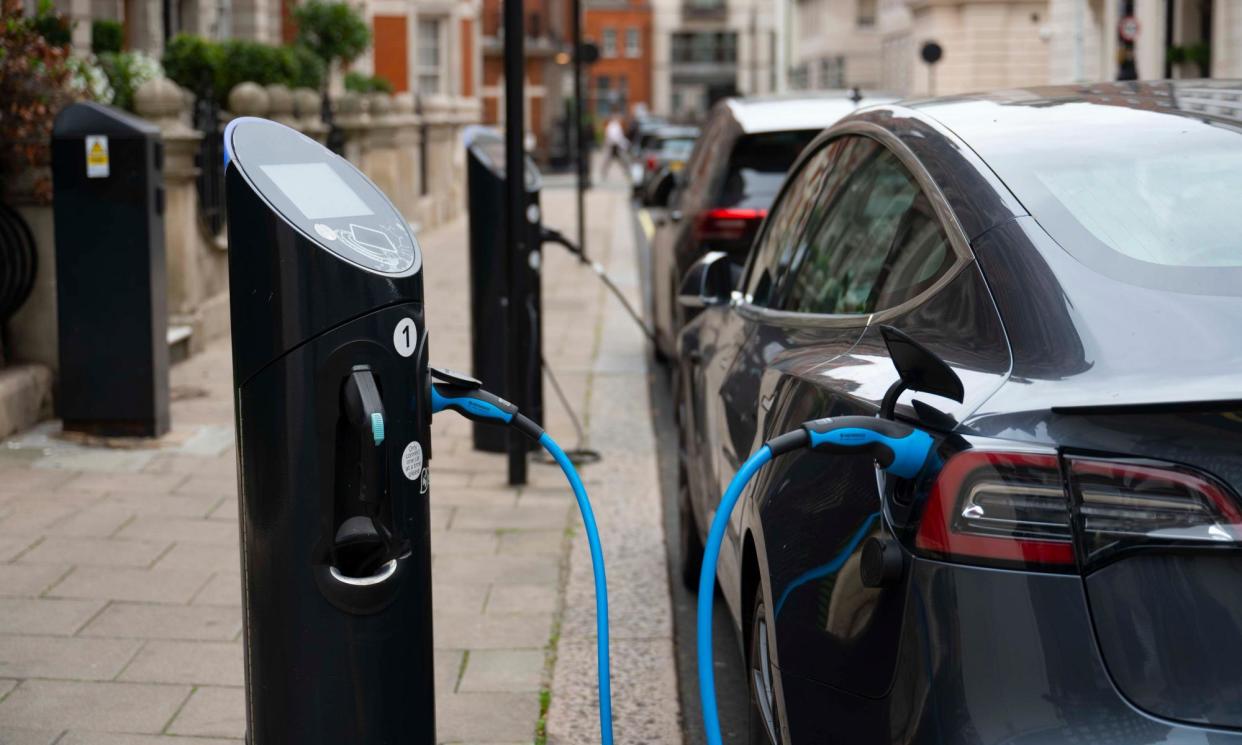Post-Brexit watchdog ‘ready’ to investigate flood of cheaper Chinese electric cars

The head of Britain’s post-Brexit trade watchdog has said it is ready to follow Brussels in launching an investigation into Chinese companies flooding the market for electric cars, but the government has not asked it to do so.
Oliver Griffiths, the chief executive of the UK’s Trade Remedies Authority (TRA), which advises the government on trade defence, said it was keeping lines of communication open with ministers and had been in close contact with the car industry. “We’ll be ready to go if anyone does come to us,” he told the Guardian in an interview.
The European Commission launched an anti-subsidy investigation into Chinese electric vehicles (EVs) late last year after warning that global markets were being “flooded” with cheap imports from the world’s second largest economy.
Britain would have been covered by the inquiry as a member state but has led an independent trade policy since leaving the EU four years ago. Under the UK’s post-Brexit system, the TRA can be called on by ministers or industry to investigate whether import controls are needed to protect Britain’s economic interests.
However, Griffiths said no request by the government or carmakers had been made since Brussels launched its investigation in October. “We haven’t had either of those two things happen on electric vehicles. But I know people are watching it really closely,” he said.
“We’ve been in close and regular contact with the industry on this one, and lots of people are looking at the import numbers. Similarly, I know government have a fairly close watching brief on this one. All eyes will be on Brussels later on this year when they could potentially bring out an interim measure on this.”
Chinese carmakers including BYD and Nio are hoping to become big players in international markets after a sharp increase in production over recent years, with help from tax breaks, loans and other subsidies from Beijing.
China overtook Japan as the world’s largest car exporter last year, while the Shenzhen-based manufacturer BYD last quarter surpassed Elon Musk’s Tesla as the biggest-selling electric carmaker. The EU estimates China’s share of EVs sold in Europe has grown to 8% and could hit 15% by 2025, while AutoTrader expects one-sixth of the UK market to be controlled by Chinese firms by the end of the decade.
Concern is growing among some senior backbench MPs over the future of the British car industry. Last year UK members of the inter-parliamentary alliance on China – co-chaired by the former Conservative party leader Iain Duncan Smith and the Labour peer Helena Kennedy – said the UK was “sleep-walking” into a situation where carmakers could be “undercut to the point of extinction” by Chinese companies.
Sam Lowe, a trade policy expert at Flint Global and former member of the UK government’s strategic trade advisory group, said last week that he expected the EU to impose tariffs on Chinese EVs this year.
“While the UK government and industry are currently publicly reluctant to replicate the EU measures, this will probably change once China-originating cars originally destined for the EU turn up in observable quantities on British driveways,” he said.
Griffiths warned there was a danger that an investigation into Chinese EVs could trigger retaliatory measures, highlighting that Beijing had launched an investigation into the alleged dumping of French brandy.
“If we were to do something in this space, the danger is that there is then a response from the country being investigated. And I think people are very aware of that,” he said.
Labour and the Conservatives have expressed desire to grow domestic EV manufacturing capacity, with the government offering £500m in subsidies to Tata, the Indian owner of Jaguar Land Rover, to build an electric car battery plant.
However, the prospect of import protections are not universally popular in the EU, where German companies – often with tie-ups with Chinese firms or significant sales in the country – have expressed unease.
Several carmakers in Britain have links with China, including JLR, which has a joint venture in the country. China has also acted as a big investor in the UK, including through the Chinese-owned battery company Envision AESC, which runs the UK’s only “gigafactory” in Sunderland, supplying Nissan, and Geely, which owns the black-cab maker London Electric Vehicle Company.
Griffiths said the structure of the UK car industry could influence whether import restrictions would help or hinder British firms, while suggesting that cheap Chinese imports could benefit consumers and the push to net zero.
“This is essentially a consumer good that could be much cheaper, that could really accelerate the transition to net zero. So there are very important equities on both sides,” he said.
“We obviously won’t take a view on this unless and until we’re asked to start a case. But I think it’s an interesting example where you see a number of different public policy goals coming into land within one investigation.”
A government spokesperson said: “UK car manufacturers have not discussed their concerns with the TRA or requested an investigation into electric vehicle imports from China.
“We’re firmly backing our auto industry with £2bn of capital and R&D funding to 2030, Tata’s investment of over £4bn to build a new gigafactory and Nissan’s £2bn EV investment in Sunderland that will create jobs and opportunities across the country.”


